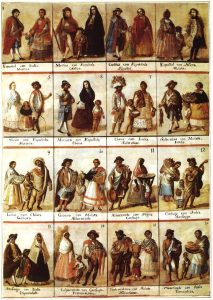It has always annoyed me that Hispanic heritage month spans two months. We don’t even get our own month! What do we even call ourselves? Hispanics? Latinos? Latinx? This morning, for the first time (Yes, while in the shower!), the light bulb went off. Why should we have one solid month when we are a mixed people? It makes sense that we should have some September and some October mixta. After all, we are the offspring of the colonial embrace. Media-media (half and half). It is that mixing that seems to confuse so many people. Not being members of a monocultural society with allegedly pure lineage (lines of ancestry often being obfuscated by the keepers of family secrets.)

I have shared the Spanish Casta Coloniale chart breaking down colonials by race and ethnicity before, but it bears sharing again here. This table represents the invention of race, of difference, of the codification of human beings by color and location of their birth and, significantly, assigning a societal value to each of those categories. The Casta System also linked one’s race with his or her behavior, personality, and social status. Most importantly, this institutional racism entitled members of Spanish colonial society to certain privileges based on their race. We are contending with the impact of that codification everyday as racists cling to the lies that were promulgated by European colonizers for centuries and imported and advanced by those who settled in North America for the past 500 years.
I have always wanted to belong. To be a member of a tribe. To have shared traditions. To have a shared history. Getting my DNA results a few years back and seeing the word Taíno in writing brought me to tears. We had been told for decades that the Taínos were extinct. Clearly not, as my DNA proves. It continually amazes me how frequently people exclaim – in obvious surprise, “You don’t look Puerto Rican!” This is why Aurora Levins Morales’ poem, “Child of the Americas” has become an anthem for me and many other Puerto Ricans.
Child of the Americas
Aurora Levins Morales (1986)
I am a child of the Americas,
a light-skinned mestiza of the Caribbean,
a child of many diaspora, born into this continent at a crossroads.
I am a U.S. Puerto Rican Jew,
a product of the ghettos of New York I have never known.
An immigrant and the daughter and granddaughter of immigrants.
I speak English with passion: it’s the tongue of my consciousness,
a flashing knife blade of crystal, my tool, my craft.
I am Caribeña, island grown. Spanish is my flesh,
Ripples from my tongue, lodges in my hips:
the language of garlic and mangoes,
the singing of poetry, the flying gestures of my hands.
I am of Latinoamerica, rooted in the history of my continent:
I speak from that body.
I am not African. Africa is in me, but I cannot return.
I am not taína. Taíno is in me, but there is no way back.
I am not European. Europe lives in me, but I have no home there.
I am new. History made me. My first language was Spanglish.
I was born at the crossroads and I am whole.
My Spanish blood, and Taino blood, and African blood, and Irish blood, and French blood, all commingle to make me a whole human being. A being who some might refer to as a member of a “mongrel race.” We celebrate our complex composition. We celebrate the fact that we are not extinct. We celebrate the fact that we have a common history, language, food, and passion. We celebrate hope for the future.
Today I am attending Hunter College’s Center for Puerto Rican Studies’ (el Centro) conference, “Puerto Rico, Puerto Ricans Diaspora Summit 2019: Rebuild Puerto Rico, Two Years after Maria – Challenges and Opportunities”. The impact of colonialism on the people of Puerto Rico (living on the islands and elsewhere), and those of Puerto Rican descent continues to be profound as Puerto Rico’s lack of agency (taxation without representation) continues.
It is critical that we mestizos correct the record. That we conduct research and write our history from multiple perspectives to clarify and correct inaccuracies and untruths. Not as victims or the other, but as a whole people who share membership in an incredible tribe. I am grateful to be a part of this tribe and, to paraphrase Ms. Levin Morales, to be whole!
Onward!
Wendy
New York, NY,
September 20, 2019
